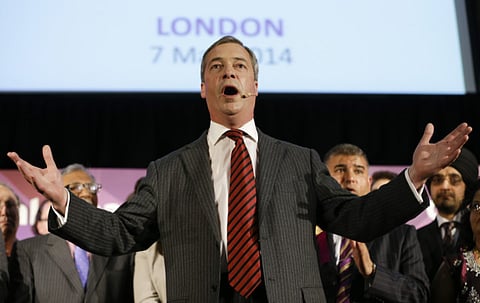Left can take on Europe’s far right
None of the EU reforms that Conservatives want will loosen corporate grip

Nothing, it seems, can stop the rise of Ukip. However outrageous its luminaries’ pronouncements or hypocritical its leaders’ behaviour, it is still expected to top next week’s European elections.
No matter that the rising star of Ukip’s youth wing resigns in disgust at the party’s racism, or that its ex-Tory banker leader is involved in one expenses scandal after another, or that on most issues — from a flat tax to wholesale privatisation of UK’s National Health Service (NHS) — the majority of Ukip’s voters do not remotely share its ultra-Thatcherite politics. It is not just that on immigration and the European Union (EU) they do — or that few have much interest in Ukip’s actual policies. As it has moved out of the Tory backwoods into Labour heartlands, Nigel Farage’s party has succeeded in tapping into a deep vein of disenfranchisement and anti-establishment anger.
The more the political class turns on Farage, the more it confirms his phoney status as an outsider. And it is the same story across Europe: The populist right is on the march, along with a hotch-potch of anti-Brussels mavericks such as Italy’s Beppe Grillo — and, in a handful of states, growing parties of the radical left. In France, Denmark and Finland, right-wing nationalist and racist parties are set to win more than 20 per cent of the vote — with Geert Wilders’ Muslim-baiting Freedom party not far behind in the Netherlands. So is the virulently anti-Roma and antisemitic Jobbik in Hungary, while the neo-Nazi Golden Dawn party in Greece is on the way to winning its first Euro seats.
In fact, they are a disparate bunch. While Ukip are free-marketeers, the French National Front pitches for working class votes with demands for state intervention and social protection. And although opposition to immigration is a mobilising cause for most of these parties, some such as Jobbik scapegoat existing minorities instead. What is common to all is that they are drawing on the social discontent that has mushroomed across the continent on the back of a decade of growing insecurity and unemployment, falling living standards and austerity. For many of their voters abandoned by the establishment parties, the populist right looks like the only alternative to hand. Not that their advance will change anything on the ground. The European parliament is barely a shadow of a democratic assembly. “Choose who’s in charge in Europe”, its posters demand in an effort to convince sceptical voters to turn out next week.
In reality, they will be choosing no such thing. That is not just because Strasbourg is weak and toothless and the establishment alliance of centre-right and centre-left will continue to dominate it — though success for the populist right will certainly encourage the Euro-elites to pander more to xenophobia and bigotry.
It is that the council of ministers and commission will go on calling the shots in cahoots with the corporate interests that wield the real power at the heart of the EU. It is the ever-growing grip of banks and corporations on the Brussels machinery — reflected in the 30,000 lobbyists who feed off its work — that has shaped each new regulation, commission proposal and court ruling.
The result is a system that has given a failed economic model the force of treaty, entrenching deregulation and privatisation while corporate power is privileged over employment and social rights. It is an approach being played out in the Transatlantic Trade and Investment Partnership deal being negotiated between the EU and US — that would allow companies to bypass the courts to enforce business-drafted regulations over elected public authorities. The result has been an erosion of the modest social protections built into the single market: Growing restrictions on public intervention and investment in the name of competition, and the exploitation of migrant workers to undercut existing employees in the name of free movement of services.
Since the crash of 2008 turned into the crisis of the eurozone, an EU that had come to be seen as a partial defence of social gains has turned into an avatar of austerity in the vanguard of the drive to roll them back, imposing devastating cuts on elected governments across the continent. The impact of Troika dictat and Eurozone austerity on already stagnating living standards and economies hollowed out in the glory days of neoliberalism has been calamitous. It has opened the door to the rise of the far right in mainland Europe. In Britain, the City and the coalition have done it all by themselves.
None of the EU reforms David Cameron’s Conservatives want to negotiate and put to a referendum will loosen the corporate grip on Brussels. In fact, they want to extend market “liberalisation”.
Ed Miliband has, meanwhile, argued for “comprehensive” reform, including to restrictions on state aid and intervention. However, change in Europe will need to go much further — and Labour’s refusal to back a referendum only reinforces the sense of the EU as an anti-democratic stitch-up.
So long as Europe’s establishment remains locked in this Brussels orthodoxy, the only antidote to the growth of the Far Right is a populism of the Left: One that targets class and corporate power instead of foreigners. In different ways, that has been the approach of Syriza, now leading the polls in Greece, and the Dutch Socialist party, expected to overtake Labour for the first time. Without it the rise of the racists and xenophobes will go on.
— Guardian News & Media Ltd


